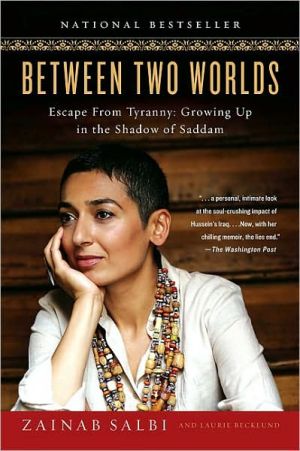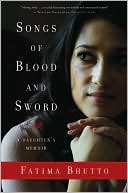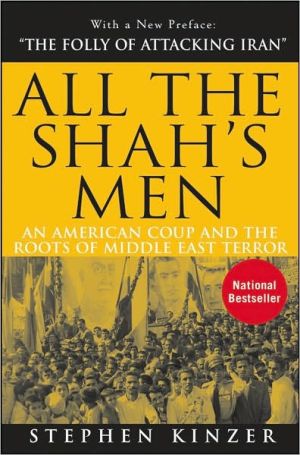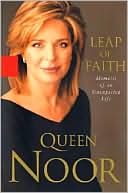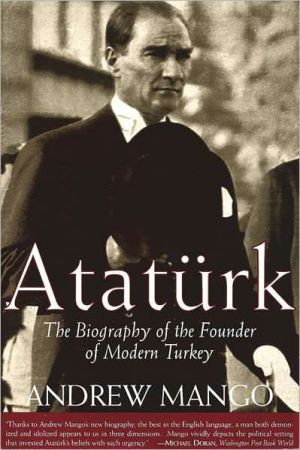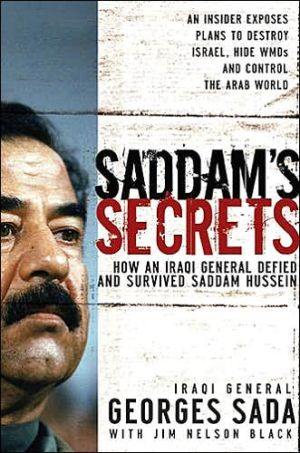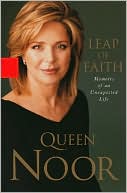Between Two Worlds: Escape from Tyranny: Growing Up in the Shadow of Saddam
Zainab Salbi was eleven years old when her father was chosen to serve as Saddam Hussein's personal pilot, her family often forced to spend weekends with Saddam where he watched their every move. As a palace insider, Zainab offers a singular glimpse of what it is like to come of age under a dictator and provides an intimate portrait of the man she was taught to call "uncle." She watched as Saddam pitted friends, spouses, and even children against each other to compete for his approval. She was...
Search in google:
Zainab Salbi was eleven years old when her father was chosen to serve as Saddam Hussein's personal pilot, her family often forced to spend weekends with Saddam where he watched their every move. As a palace insider, Zainab offers a singular glimpse of what it is like to come of age under a dictator and provides an intimate portrait of the man she was taught to call "uncle." She watched as Saddam pitted friends, spouses, and even children against each other to compete for his approval. She was sent to donate her mother's jewelry to one of the world's richest men, asked to erase her memory as she heard of crimes she was not supposed to hear of, and witnessed her mother hiding her tears lest it upset Saddam. Her mother eventually sent Zainab to America for an arranged marriage, to spare her from Saddam's growing affection, but the marriage intended to save her turned out to be another world of tyranny and abuse.Despite extraordinary psychological challenges, Zainab started over. She forged a new identity as a champion of female victims of war, dedicating her life to speaking out on behalf of oppressed women around the world. Her unique nonprofit organization has been featured in the media numerous times, including multiple appearances by Zainab on The Oprah Winfrey Show. But until now, Zainab has never told this very personal tale. In this intimate portrait, she reveals the tyrant through the eyes of a child, a secretly rebellious teenager, an abused wife, and ultimately a professional woman coming to terms with the horror of secrets her mother revealed only on her deathbed. Through her ability to come to terms with the child she used to be and the dangerous world in which she managed to survive, Between Two Worlds emerges as a story of heroism like no other The Washington Post - Lynne Duke The Baathist reign of terror is well-trod literary territory, but Salbi delivers much in Between Two Worlds that is freshly poignant and newly galling. Hers is a personal, intimate look at the soul-crushing impact of Hussein's Iraq. Writing with journalist Laurie Becklund, Salbi deploys a straightforward, easy prose that is powerful in its simplicity.
Between Two Worlds\ \ By Zeinab Salbi Laurie Becklund \ Gotham Books\ ISBN: 1-592-40156-2 \ \ \ Chapter One\ THE ABBASID COIN \ My mother grew up in a grand house, with a courtyard and sixteen rooms, on the Tigris River. The house belonged to my grandfather, who died before I was born. Mama inherited from him a modest fortune-a share of the house and his factories, a quantity of gold, and a family name that means something still. But the one physical object of his that I ever really cared about was a gold coin forged a thousand years ago by Abbasid caliphs who moved the political and cultural center of the Islamic empire from Damascus eastward to Baghdad. Baghdad yields its secrets reluctantly, to those who dig, and a friend of my grandfather's discovered a bag of the coins in the course of demolishing an old building. He gave three to my grandfather, who gave one to each of his three young daughters. Mama, the youngest, designed a frame for it in the shape of a small chain and wore it around her neck always. It had a dent on one edge I can still visualize because I so often wondered what sort of blow might have caused it.\ She was a teacher when I was little and when she came home from school she would take a nap on the sofa. She had the gift of being able to fall asleep almost instantly, and she radiated utter peace as she slept. I would squeeze in next to her, take in the slightly sweaty smell of the classroom she brought home with her, and try to make my breaths match hers exactly. Between her full breasts lay the Abbasid coin. I remember breathing to the rise and fall of that ancient coin against her skin, its worn symbols gleaming softly in the afternoon light. I assumed I would wear it when I grew up and became, hopefully, as smart and beautiful as she was. Of course, I also assumed back then that Iraq would always be my home.\ Though it is hard to imagine, given all that has happened since, growing up in Baghdad was for me probably not unlike growing up in an American suburb in the 1970s. I spent many hours driving around with my mother, running errands and shopping, driving to and from school, going to piano lessons, ballet lessons, swimming lessons, and just tagging along. She kept a busy social calendar then, and in the car was the place I got to spend time with her. She loved Baghdad-she was of Baghdad-and as we drove back and forth along the boulevards lined with palm trees heavy with dates, she would tell me a little about each neighborhood as we passed through it. I took in my city through the passenger-side window-old Baghdad with its dark arcaded souk where men hammered out copper and politics, and the new Baghdad with its cafes and Al-Mansour boutiques. What I learned of my heritage, as was true for almost everything else in the first nine years of my life, I learned through her.\ We happened to be driving down the Fourteenth of Ramadan Street one day with Aunt Layla in July 1979 when an announcement came on the car radio saying that Ahmad Hassan Al-Bakr, the gray-haired man whose portrait had hung in all of my elementary school classrooms, was stepping down from the presidency in favor of his cousin, Vice President Saddam Hussein. Aunt Layla and my mother were in the front seat talking about the news, which seemed to make them ecstatically happy. I think they were giggling.\ "That's the last we'll ever see of him!" Aunt Layla said.\ "No ... more ... Aaaahmmo!" Mama whooped.\ This puzzled me. Did they know the man who was going to be the new president? Was he an uncle-an amo? Was I related to him? If our uncle was the president, why would they be happy about not seeing him anymore? I didn't understand. I asked about this puzzling new development and got a clear directive from my mother.\ "Some things aren't meant for little ears, honey," she said over her shoulder. "Some things that enter one ear need to fly straight out the other. They need to be erased from your memory."\ I learned the concept of guided imagery at age nine and a half.\ Mama's elliptical answer only made me more curious, of course, but I had a lot of time to myself in the backseat with two women as chatty as my mom and Aunt Layla in the front. So, as we drove, I practiced. I pictured this thought that they had just shot into my right ear as an arrow and tried to make it shoot straight out my left ear without leaving anything behind in my head. But each time I asked myself if the thought was still in my brain, it would pop right up again. I obviously didn't master this skill because I remember the whole scene quite clearly today, down to the route we were taking through the Khadhimiya district past the old shops selling twenty-four-karat gold that led to the mosque with the turquoise and gold dome. But, I wondered even then, if I managed to erase that thought from my brain, how could I tell?\ Every instinct in me-survival, loyalty, anger, horror, resentment, guilt, and most of all, fear-conspires to prevent me from speaking Saddam Hussein's name out loud. The fact that I use his name now, acknowledge a personal connection to him at all, is for me a watershed no matter how trivial that might seem. He wasn't related to me or my family by blood, but some of my childhood and virtually all of my teenage weekends were merged with his nonetheless. I was taught to call him Amo and he treated me like a niece. Though it disturbs me, I can still reach back and conjure up a few fond memories of him. I would convict him of crimes against humanity without a second thought, but not because he singled me out for unkindness.\ Technically, he was just my father's employer. My father was his pilot, a commercial airlines captain Saddam drafted to serve as his personal pilot in the early 1980s. When I was growing up in Iraq, people used to refer to me as the "pilot's daughter." I hated that term. I still do. It stole from me my very identity, everything I wanted to be. It defined me in terms of my father and defined him, in turn, by his most infamous passenger: a despot millions of Iraqis feared. Had I stayed in Iraq, there are people who no doubt would be calling me that still, though my father stopped being his pilot many years ago and no longer flies. Instead, because of a chain of events Saddam Hussein set in motion, though I did not know it then, I found myself stranded in America by the Gulf War. That was the most painful time of my life. For very good reasons, I had come to trust no one, not even my mother. I had just turned twenty-one, and I found myself all alone for the first time as fresh new fears were heaped on all the old ones. I did what I needed to do in order to survive, though it was not nearly as simple as I make it sound: I erased the pilot's daughter and started over. I creased my life down the middle like the spine of a book when you bend the pages back very hard. You could read the first half of the book of my life, then read the second half, and not know they were lived by the same person. I wanted it that way. I needed it that way.\ I created a whole new identity for myself as the founder and president of a nonprofit women's organization called Women for Women International, which supports women survivors of war. For over a decade now, I have gone around the world, meeting with victims of war and the awful mass rape the world seems to accept as an inevitable consequence of war. Seeing the criminal patterns behind such violence, I began encouraging women to break their silence and speak out so their oppressors could be punished. Yet, I have been unable to break my own. It's remarkable, really. I appear on television and give speeches around the world, but I still can't say the words Saddam Hussein on my front porch. The many reporters who have interviewed me never asked if I knew Saddam Hussein personally-why would they? So, I was permitted to remain silent, telling other people's stories and never my own, hiding in plain sight, ever fearful someone would recognize me someday and say hey, there she is, the pilot's daughter, the friend of Saddam.\ When Saddam Hussein was finally captured in 2003 in that hole he had dug in the dirt, I found myself fighting tears. I didn't want to enjoy another person's humiliation, even if it was my enemy's. I think my tears were more for me than for him, to protect my own humanity against feelings of vengeance and hatred. I happened to be at a conference in Jordan that day, and everyone erupted in cheers. One of my friends cheered in the name of her father, an official who had been publicly executed by Saddam. Another vowed to charge him with genocide to avenge Kurdish relatives who were among thousands he had gassed. I yearned to seek redress on behalf of my mother. But who would charge Saddam with crushing human souls? I thought of all my beloved aunts, the spunky ones, the stylish and determined ones the West still gives him credit for liberating, and I wondered, who would remember, given the countless people he killed, the seemingly trivial wounds of those he allowed to live? Would women once again fall beneath the radar screen of history, which preferred to measure war in terms of incident reports and expenditures and kilotons and battles and casualties? How long would women continue to be complicit in their suffering by remaining silent?\ For the first time in years, I could feel the girl that I had been nagging at me, bringing back memories I had struggled, at great personal cost, to suppress. I wanted to make myself whole again. I wanted to come clean. I wanted to do my job without feeling like a hypocrite. But I had been afraid for so long I didn't know how to get rid of the layers of fear inside me. Because I had survived by hiding my past, even from myself, I had never really pieced together the story of my own life. Which of the things that had happened to me were causes and which were effects? Which were common to all Iraqis, and which were unique to my family? Certainly, I had never come to terms with the big questions, like how Saddam Hussein had managed to stay in power for a quarter century when most Iraqis hated him and there were ongoing plots to kill him. Certainly there were guns. Certainly there was funding early on from the U.S., European, and Soviet governments, each pushing its own geopolitical agenda. But not even he had enough bullets to kill twenty-five million people. How did he manage to dictate the way virtually every Iraqi spoke, loved, married, prayed, played, smiled, learned, dressed, ate, deceived, despaired, celebrated, and died? Make decent people like my parents complicit in their own oppression? Turn my mother from a free spirit into a premature matron who managed to fit in at palace parties? Keep me scared to death of him long after he had no power to hurt me?\ When did it all start? I suspect the answer to that question is this: the moment a mother is afraid to answer a young child's question honestly. By the time I left for America at age twenty, so many silences and half-answered questions had accumulated between Mama and me that I blamed her for certain ugly turns my life had taken. Only when she was dying, and I had learned how to listen to women who had survived other despots, did she tell me secrets she had kept from me for most of my life. I still cry when I think how young she was, just fifty-two. She was unable to speak, and the only means she had of communicating was by writing. I asked her then about what her life was like during the two decades she and my father lived under his thumb and she wrote her thoughts to me in a drugstore notebook. Writing was very difficult for her, and her observations were often short and dispassionate. I include some entries here to give a sense of how much she spared her children. I keep her notebook in a white carry-on bag I used to sit on in airports. I open it rarely because it is the only thing I have that brings back the smell of her.\ Iraqis have a saying about Saddam Hussein. They say he wooed us in the 1970s, we endured the 1980s, and we paid the price in the 1990s and beyond. I have always thought of myself as the lucky one, and one of the many reasons is that I grew up in modern Iraq's most promising decade. While the West struggled with the oil embargo of the early 1970s, petrodollars poured into our nationalized oil monopoly. The Iraqi dinar soared, electricity lit up mud villages, modern schools and hospitals mushroomed, Japanese cars sped across new highways, and whole office buildings rose up while we were away on summer vacation. Iraqi students went abroad then on government scholarships and Saddam's socialist-based Baath Party instigated a massive compulsory campaign to combat illiteracy (and spread his ideology) that taught so many people to read so fast that Iraq became a model for the developing world and won a UNESCO prize. I try not to dwell on how Iraqi faith was squandered or how my parents' generation deluded itself into assuming it came with no price tag.\ My parents were married on the cusp of all this progress in 1968, shortly after my mother graduated from college and my father graduated from a pilot's academy after studying in Scotland. My favorite picture of the two together is a black-and-white snapshot taken at their engagement party that shows them standing against a garden trellis with white wrought iron furniture in the foreground, my father trim and debonair in a suit and my mother a dark-haired beauty wearing Piccadilly makeup and a 60s miniskirt. An English term springs to mind for which I can think of no adequate Arabic equivalent, and it almost breaks my heart when I think of it. They were happy-go-lucky.\ I was born the year after they were married, the same month my father was promoted to captain by Iraqi Airways. New subdivisions were being laid out in Baghdad at the time, with names like the Professors Neighborhood and the Engineers Neighborhood (as well as neighborhoods with smaller lots for blue-collar workers) and government incentives were offered to people in those fields to move there. My parents took advantage of his promotion to build a home in the Airlines Neighborhood and were proud that they were able to do so without help from their families. Because my birth coincided with my father's promotion, my parents referred to me as "the child who brought blessings," baraka, to our family, and that small superstition would follow me as I grew. Whenever there was a new moon, Mama would ask me to smile at her, saying my smile would bless the upcoming month as my birth had blessed their first year. Five years later, they would have a son, Haider, and five years after that another, Hassan. With each birth, my father would plant a palm tree in our backyard, and they would name the palm tree after the child. My father was the gardener in our family. Our backyard was filled with his gardenias and narange, limes and sweet lemon-native citruses I often crave and rarely find outside Baghdad.\ Mama started a scrapbook for me when I was a baby, a white quilted volume I still have, with a glittery stork and a lavender puppy on the cover. Inside are pictures of our family, my childhood birthday parties, and casual snapshots of friends like the Christian neighbor who used to ask my mother for advice on her daughter's Muslim boyfriends-all defined for whatever reasons by their inclusion in this album as relevant to my birth. I noticed after she died that there is not one picture of Amo in this book, though many were taken, and I wonder if she took them out or never included them in the first place. She was always selective in her choice of memories to preserve for me.\ I sometimes forget how close my father and I were then and how easily he made me laugh. In one photo of us together we are modeling twin dishdashas, long cotton tunics that are worn by both sexes. How many fathers have matching outfits made for them and their two-year-old daughters? I called him Baba, the word for "Daddy" in Arabic, but his name is Basil. Most of his pictures show him on vacation, mugging for the camera with a child's plastic swim tube around his waist at a tropical beach, perched atop a statue in Thailand, chatting like an old friend with the statue of a bearded miner at Knott's Berry Farm. To cool off on scorching late summer afternoons we used to go swimming at the Hunting Club or go with my cousins on my uncle's boat to Pig's Island, a large sandbar in the Tigris that must have been named for wild boar. My father had spent time there as a boy and our outings seemed to bring out the little boy in him. Some of my fondest memories are of calm summer nights in that place filled with the peaceful sound of the Muezzin calling evening prayers, and laughter; my mother's strong and engaging, my father's mischievous as he dropped ice down my mother's bathing suit, and the normal shouts of a gaggle of children. After sunset, the lights from the riverside cafes on the Corniche would come on and reflect in lazy lines of blue, green, white, and red on the river. The colors would sparkle if the breeze picked up and I imagined fairies were dipping their wings into the water.\ (Continues...)\ \ \ \ \ Excerpted from Between Two Worlds by Zeinab Salbi Laurie Becklund Excerpted by permission.\ All rights reserved. No part of this excerpt may be reproduced or reprinted without permission in writing from the publisher.\ Excerpts are provided by Dial-A-Book Inc. solely for the personal use of visitors to this web site. \ \
\ Lynne DukeThe Baathist reign of terror is well-trod literary territory, but Salbi delivers much in Between Two Worlds that is freshly poignant and newly galling. Hers is a personal, intimate look at the soul-crushing impact of Hussein's Iraq. Writing with journalist Laurie Becklund, Salbi deploys a straightforward, easy prose that is powerful in its simplicity.\ — The Washington Post\ \ \ \ \ Publishers WeeklyThe question "why did they stay?" haunts this engrossing memoir, as Salbi shows how Saddam Hussein "managed to make decent people like [her] parents complicit in their own oppression." "Growing up in Baghdad," the author remembers, "was probably not unlike growing up in an American suburb," but then Salbi's father became Saddam's private pilot. Gradually, the man who treated her like a niece became a man she called " `Amo' [Uncle] not out of affection, but because I was afraid to say his name-Saddam Hussein-out loud." Interspersed with Salbi's memories are her mother's recollections of imposed visits from and disquieting parties with Saddam. These riveting passages reveal a self-absorbed man who, as Salbi comes to understand, "saw no conflict between feeling fondness for people and killing them." Making a physical escape from Iraq was easy-a marriage was arranged in the U.S. to an abusive husband (from whom Salbi also had to escape)-compared with making the new life that culminated in founding Women for Women International, an organization that assists women victimized by war. Books to come will offer more historical and statistical data, but this may be the most honest account of life within Saddam's circle so far; not a rebel's account, although Salbi is certainly a dissident, rather, it's an enlightening revelation of how, by barely perceptible stages, decent people make accommodations in a horrific regime. (Oct.) Copyright 2005 Reed Business Information.\ \ \ Library JournalWith the help of journalist Becklund, Salbi (founder and president, Women for Women International) here aims to document her privileged yet harrowing life in her native Iraq, recounting her memories of family friend Saddam Hussein. She demonstrates that the mechanisms of terror practiced by Saddam's tyrannical regime rendered her so impaired that she could not protest. Nor could she voice her people's suffering even when she moved to America in 1991. This book provides very important observations about Saddam's character and his ability to intimidate even close friends. The author vividly describes her late liberation from his "charm" even as she insists on calling him by one of the loveliest names used by Iraqis, "Uncle." Here we see how fear could lead to blind loyalty and exaggerated demonstrations of love. Through a journey colored with loss and hope, readers encounter a story of self-awakening and of realizing the will to live and survive. Recommended for public libraries. [See Prepub Alert, LJ 6/1/05.]-Sadiq Alkoriji, Tomball Coll. & Community Lib., Harris Cty., TX Copyright 2005 Reed Business Information.\ \ \ \ \ Kirkus Reviews"He was handsome and charming-no one who meets him ever denies he is attractive." Thus Saddam Hussein, up close and personal. The quotation comes from the diary of Salbi's mother, Alia, a vivacious secular Iraqi whose husband, Salbi's father, was an airline pilot turned advisor on aviation matters, and for a time the former Iraqi leader's personal pilot. "Technically," Salbi writes, "[Saddam] was just my father's employer," but he was a friend of sorts, too; "Uncle" liked to show up at their home late at night with a few boxes of Chivas Regal to talk and dance the night away. He was jovial in those days, too, though he confided to Alia that he had killed one of his mistresses when she became involved with another man, never a good strategy with a murderous dictator. The message did not go unheard, and who could deny the leader whatever he wanted? Thus was the milieu in which Salbi grew up, though there is much more to her memoir than all that. She affectingly describes, for example, her childhood discovery of sectarian frictions when a Sunni classmate begins to shun her ("He made me feel like I had cooties"); more strongly still, she recounts the loss of another childhood friendship to politics when a young classmate's father runs afoul of and is dispatched by the Ba'athist regime. "By the time I met the man who ordered her father's execution three years later," she writes, "I had taught myself to forget her last name." Childhood passes, and when Hussein begins to take closer interest in the adolescent Salbi, her parents send her off to an arranged marriage in America, where she finds herself more or less exiled at the outbreak of the Gulf War-and therein lies another story of challengeovercome. Though the writing is flat, Salbi's story has value for those hoping to understand the strangeness and ubiquity of Saddam's regime.\ \
